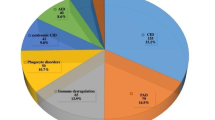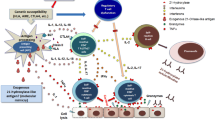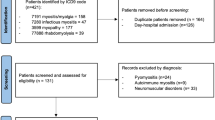Abstract
Hyperimmunoglobulinemia D Syndrome (HIDS) has rarely been reported in Arabs. Moreover, the simultaneous presence of mutations in MEFV and MVK segregating in the same family is exceptional. We report an Arabic girl presenting since the age of 8-years with two patterns of recurrent episodes of fever, and associated with a spectrum of clinical features suggestive of overlap between familial Mediterranean fever (FMF) and HIDS. Her 19-year old brother presented since the age of 1 year with prolonged episodes of fever and was diagnosed with HIDS at the age of 7 years based on clinical features and homozygosity for p.V377I mutation in MVK. Shorter episodes of fever and abdominal pain more consistent with FMF ensued since the age of 17 years. Genetic testing done for both patients and all other family members revealed simultaneous presence of mutations in MEFV and MVK but with a variable clinical spectrum ranging from asymptomatic to severe manifestations. Both of our patients are homozygous for p.V377I MVK mutation; the girl is a compound heterozygote for p.E148Q/p.P369S/p.R408G and p.E167D/p.F479L MEFV mutations whereas the brother is a compound heterozygote for p.E148Q/p.P369S/p.R408G and p.M680I MEFV mutations. The clinical implications of having more than one mutation in different genes of monogenic autoinflammatory diseases in the same individual are not clear but may explain atypical clinical manifestations such as the overlap features of both FMF and HIDS in this family.

Similar content being viewed by others
References
Masters SL, Simon A, Aksentijevich I, Kastner DL. Horror autoinflammaticus: the molecular pathophysiology of autoinflammatory disease. Annu Rev Immunol. 2009;27:621–68.
Samuels J, Ozen S. Familial Mediterranean fever and the other autoinflammatory syndromes: evaluation of the patient with recurrent fever. Curr Opin Rheumatol. 2006;18:108–17.
El-Shanti H, Majeed HA, El-Khateeb M. Familial mediterranean fever in Arabs. Lancet. 2006;367:1016–24.
van der Hilst JC, Bodar EJ, Barron KS, Frenkel J, Drenth JP, van der Meer JW, et al. International HIDS Study Group. Long-term follow-up, clinical features, and quality of life in a series of 103 patients with hyperimmunoglobulinemia D syndrome. Medicine (Baltimore). 2008;87:301–10.
Drenth JP, Haagsma CJ, van der Meer JW. Hyperimmunoglobulinemia D and periodic fever syndrome. The clinical spectrum in a series of 50 patients. International Hyper-IgD Study Group. Medicine (Baltimore). 1994;73:133–44.
Hammoudeh M. Hyperimmunoglobulinemia D, syndrome in an Arab child. Clin Rheumatol. 2005;24(1):92–4.
Houten SM, van Woerden CS, Wijburg FA, Wanders RJ, Waterham HR. Carrier frequency of the V377I (1129G>A) MVK mutation, associated with Hyper-IgD and periodic fever syndrome, in the Netherlands. Eur J Hum Genet. 2003;11(2):196–200.
Dodé C, André M, Bienvenu T, Hausfater P, Pêcheux C, Bienvenu J, et al. French Heraditary Recurrent Inflammatory Disorder Study Group. The enlarging clinical, genetic, and population spectrum of tumor necrosis factor receptor-associated periodic syndrome. Arthritis Rheum. 2002;46(8):2181–8.
Stojanov S, Lohse P, McDermott MF, Renner ED, Kéry A, Mirakian R, et al. Periodic fever due to a novel TNFRSF1A mutation in a heterozygous Chinese carrier of MEFV E148Q. Rheumatology(Oxf). 2004;43:26–7.
Arkwright PD, McDermott MF, Houten SM, Frenkel J, Waterham HR, Aganna E, et al. Hyper IgD syndrome (HIDS) associated with in vitro evidence of defective monocyte TNFRSF1A shedding and partial response to TNF receptor blockade with etanercept. Clin Exp Immunol. 2002;130:484–8.
Stojanov S, Lohse P, Lohse P, Hoffmann F, Renner ED, Zellerer S, et al. Molecular analysis of the MVK and TNFRSF1A genes in patients with a clinical presentation typical of the hyperimmunoglobulinemia D with periodic fever syndrome: a low penetrance TNFRSF1A variant in a heterozygous MVK carrier possibly influences the phenotype of hyperimmunoglobulinemia D with periodic fever syndrome or vice versa. Arthritis Rheum. 2004;50:1951–8.
Singh-Grewal D, Chaitow J, Aksentijevich I, Christodoulou J. Coexistent MEFV and CIAS1 mutations manifesting as familial Mediterranean fever plus deafness. Ann Rheum Dis. 2007;66:1541.
Chandrakasan S, Chwaine S, Adams M, Fathalla BM. Clinical and genetic profile of children with periodic fever syndromes from a Single Medical Centre in South East Michigan. J Clin Immunol. 2013 Nov 15.
Simon A, van der Meer JW, Vesely R, Myrdal U, Yoshimura K, Duys P, et al. International HIDS Study Group. Approach to genetic analysis in the diagnosis of hereditary autoinflammatory syndromes. Rheumatology. 2006;45:269–73.
Gattorno M, Sormani MP, D’Osualdo A, Pelagatti MA, Caroli F, Federici S, et al. A diagnostic score for molecular analysis of hereditary autoinflammatory syndromes with periodic fever in children. Arthritis Rheum. 2008;58:1823–32.
Acknowledgments
This work is funded in part by Hamad Medical Corporation / Medical research committee approval 13438/13 and 12168/12 (BF) and Qatar National Research Fund (QNRF), Grant # NPRP 09-374-3-092 (HE, RZT)
Disclosures
Nothing to disclose.
Author information
Authors and Affiliations
Corresponding author
Rights and permissions
About this article
Cite this article
Moussa, T., Aladbe, B., Taha, R.Z. et al. Overlap of Familial Mediterranean Fever and Hyper-IgD Syndrome in an Arabic Kindred. J Clin Immunol 35, 249–253 (2015). https://doi.org/10.1007/s10875-015-0140-x
Received:
Accepted:
Published:
Issue Date:
DOI: https://doi.org/10.1007/s10875-015-0140-x




